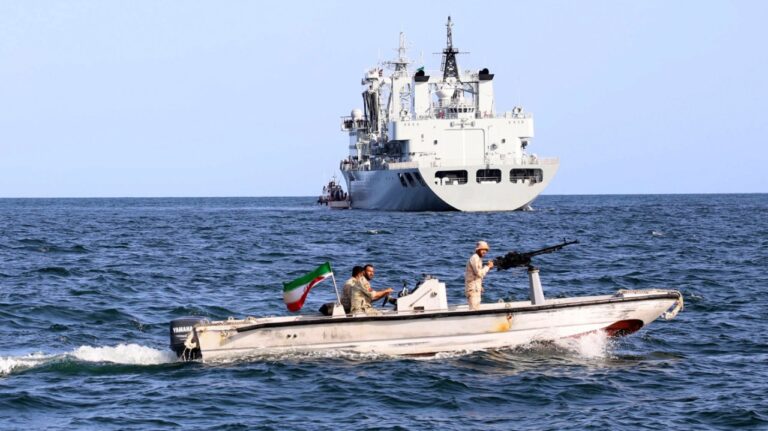The stories of conflicts between China, Russia, and Iran and the United States and its allies began independently. Each has its roots, and the causes are completely different from the others.
Nevertheless, the logic that governs human conflict is pushing these three forces toward further strategic cooperation. It is likely to develop further and could eventually take the form of a fully aligned geopolitical faction whose members act together against a common enemy.
The outcomes that regimes in Beijing, Moscow, and Tehran seek to achieve through strategy are not the same. However, this is not the first time that major powers with vastly different geostrategies have collaborated with each other.
Fascist Italy opposed Germany’s plans to annex Austria, so Nazi Germany armed Ethiopians during the 1935-1936 Italo-Ethiopian War. Nazi Germany also maintained close military and economic cooperation with China, but ultimately chose to ally with Japan during the Sino-Japanese War.
After all, the determining factor in the strategic choices of Berlin, Tokyo, and Rome that led to the formation of the Axis was the presence of the same main enemy in the Western democracies.
Iran wants to become the hegemon in the Middle East. This goal is embedded in the ideological DNA of Tehran’s current ruling regime. Support for Shiite rebel movements, relentless hostility to Israel, and the creation of states within states in Lebanon and Iraq are all means to this end.The most powerful force standing in the way of this imperialist project is the United States.
Russia wants to replace the global leadership of the United States and its allies with a world of fewer great powers that dominate their neighbors and compete or cooperate with the rest of the world. It intends to become a member of these great powers, and therefore seeks to revive its lost empire in a new form.
Unlike the Soviet Union, modern Russia does not have the resources to try to dominate the world on its own, so it wants to be a leaderless country. Those in the U.S. who dream of working with Russia against China believe that U.S. global leadership is completely at odds with the objectives of the current administration in Moscow, and no amount of talk about the Chinese threat can convey this reality. They don’t understand that they can’t change it.
China is currently the only great power that can attempt to replace the United States as the world leader. This is exactly what the Beijing regime is trying to do. The resulting U.S.-China conflict continues today and will continue for the foreseeable future.
In each of these three very different strategies, the main obstacle, the main enemy to overcome, is America. But in addition to the geopolitical struggle with the United States, there is also another refrain common to Beijing, Moscow, and Tehran.
These three regimes do not want to live in a world where democracy, along with all its values, is the dominant, influential, and legitimate form of political thought and practice. They don’t want to stay in the role of political villains. Such conditions are disgusting to them and potentially very dangerous. They want their despotism to become the norm, not a departure from modern human civilization.
In this sense, too, America’s global leadership, by far the most powerful and influential proponent of democracy, is a problem that needs to be eliminated from the perspective of Beijing, Moscow, and Tehran.
Russia and Iran found a path to serious strategic cooperation in 2015 in a joint effort to save Syria’s Assad regime. Since then, they have acted together many times in the country.
As the Russo-Ukrainian war continues, Iran is exerting a significant influence on European geopolitics for the first time in modern history by supplying Russia with weapons. More weapons to fight Ukraine will be delivered to Russia by North Korea. It is highly unlikely that North Korea would take such a serious step if China objects. Additionally, China’s support for Russia in its war against Ukraine is increasing.
There is still much scope for closer cooperation between China, Russia, and Iran. So far, the new axis has not been fully formed. However, the inexorable logic of the struggle places great pressure in favor of strategic cooperation between these three factions.

They have the same main enemy: America. The two countries stand a better chance of defeating it if they work together, especially if they coordinate their actions to force the United States to divide its limited resources among geographically distinct theaters. Furthermore, any significant success of any of these three her countries would weaken America, its prestige, and its alliances, which would in turn help the other two her countries.
The world is a dynamic place right now. Many processes are accelerating. Strengthening cooperation between China, Russia, and Iran is one of the most important situations. All those who oppose the ambitions of these three states and their ruling regimes should use extreme caution.
David Batashvili is a researcher at the Georgian Foundation for Strategic and International Affairs (Rondeli Foundation) in Tbilisi, Georgia. Previously, he served as an analyst at the Georgia National Security Council.
Copyright 2024 Nexstar Media Inc. All rights reserved. This material may not be published, broadcast, rewritten, or redistributed.

